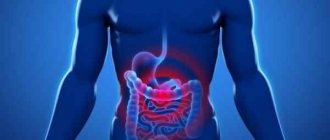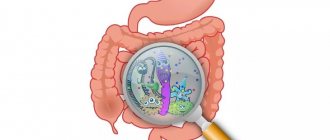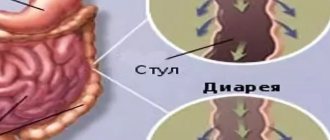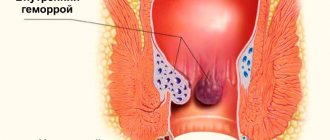Almost every woman feels heaviness in the stomach during pregnancy, because during the period of bearing a child, the body of the expectant mother undergoes significant changes. This also applies to the digestive system. Despite the fact that the condition is not considered pathologically serious, it requires compliance with preventive rules and consultation with a specialist.
Norm
Immediately after conception, the pregnant woman’s body begins to adapt to a new mode of operation.
- It activates the growth of hormonal substances, which ensure normal development and the course of the gestation period.
- The main role in this is given to progesterone, which reduces the excitability of the uterus, softens muscle tissue and the ligamentous pelvic apparatus.
- However, under the influence of progesterone, the intestines relax, which often provokes constipation and flatulence.
- Because of this, the patient may experience heaviness in the lower abdomen, which is most pronounced with changes in diet.
- As the baby develops, its size increases, and the uterine body increases accordingly.
- It begins to take up more space in the abdominal space, the pressure inside the peritoneum increases, other pelvic structures are pushed aside, problems appear in the intestines, stomach and other digestive sections.
- The center of gravity shifts, and the load on the vertebral structures increases.
As a result of such changes, a feeling of heaviness in the lumbar region and lower abdomen also occurs during pregnancy. But the appearance of such sensations can also be caused by pathological factors.
Pathological causes
If, according to all indicators, the course of pregnancy is normal, but severity is present, then doctors recommend not to worry. Most likely, everything proceeds quite naturally. Although sometimes situations arise that are pathologically dangerous for pregnancy. These include obstetric complications such as gestosis, premature placental abruption or spontaneous abortion. We also cannot exclude the possible presence of an extragenital pathological process that may occur during pregnancy.
Also possible pathologies of the gastric tract such as duodenitis or gastritis, colitis or pancreatitis, cholecystitis, etc. Therefore, it is extremely important to correctly diagnose the etiology of the unpleasant symptom. The most dangerous factors are considered to be emergency obstetric conditions, in which the patient requires urgent hospitalization and further qualified medical care. This is the only way to preserve pregnancy and save the baby’s life.
Preeclampsia
The anticipation is always very exciting
Each pregnancy takes place according to an individual plan. Most patients develop toxicosis in the early stages, accompanied by nausea and vomiting reactions. But much more dangerous than toxicosis is gestosis, which occurs in the second trimester and often causes discomfort and heaviness in the stomach during pregnancy. Preeclampsia is considered one of the complex forms of gestosis, for which edema, hypertensive symptoms and proteinuria are considered typical symptomatic manifestations.
Previously, experts called this condition during pregnancy nephropathy, but now it is called preeclampsia, which occurs against the background of hypoxic placental changes leading to serious vascular disorders. In particularly difficult cases, this triad is joined by other symptomatic manifestations such as painful heaviness in the stomach and abdomen, visual disturbances, hyperedema throughout the body, oliguria and migraines. Such conditions are extremely dangerous, because they provoke serious problems with cerebral hemodynamics and lead to convulsive seizures, which doctors call eclampsia - the most severe gestational stage and a rather dangerous obstetric complication.
The development of complex gestosis for pregnancy has an adverse effect, so such patients are often kept in hospital to avoid the development of adverse consequences for pregnancy.
Premature placental abruption
From about the middle of the second trimester, the threat of losing the baby due to premature placental abruption may hang over the mother.
- A similar condition occurs against the background of traumatic injuries or gestosis, polyhydramnios and extragenital pathologies such as kidney disease, hypertension or diabetes.
- For such a complication, heaviness and pain in the abdomen, scanty vaginal bleeding and uterine hypertonicity, as well as a noticeable deterioration in the fetal condition are considered typical.
- The placenta detaches, which leads to disruptions in the supply of nutrition to the fetus. The result is a serious threat to the child's life.
- According to statistics, in the case of 50% of placental abruption, intrauterine fetal death occurs.
- If only the central part of the placenta is exfoliated, then blood accumulates in the uterine wall, causing the formation of a hematoma. This phenomenon leads to disruption of contractile uterine functions and coagulopathic complications.
Such conditions also require the strictest obstetric control and the girl’s placement in hospital treatment.
Spontaneous interruption
You can feel heaviness in the abdominal area in the second trimester of gestation even with the development of spontaneous abortion. Therefore, the appearance of such a symptom requires mandatory medical attention and examination, because if there is no action, a woman can easily lose her baby. It is necessary to more carefully evaluate the symptomatic picture of the patient’s condition. Usually, the approach of spontaneous interruption is indicated by manifestations such as cramping or nagging pain in the lower abdomen, increased frequency of bowel movements and urination, vaginal bleeding or uterine hypertonicity.
The threat of abortion is considered only the beginning of the abortion process, and an abortion that has already begun is accompanied by amniotic rupture. Then the process of termination of pregnancy proceeds more intensively, ending with the evacuation of fetal tissue and other uterine contents surrounding them. It may also happen that not all the tissue comes out, some remains. Then residual dead tissue provokes the development of infectious processes or bleeding.
Preventing stomach discomfort during pregnancy
In order for a pregnant woman to feel good after eating, she needs to adhere to the following preventive rules:
- Reduce the portion size you consume. You can eat up to 6-7 times a day in small quantities.
- Avoid salty, fried and fatty foods. Food with a strong taste causes irritation of the mucous membranes of the stomach and intestines. Damaged structures of the gastrointestinal tract cannot cope with the food load, which causes increased gas formation, bloating and constipation.
- Avoid drinking alcoholic beverages and smoking. Bad habits negatively affect a woman’s body during pregnancy, which also affects the development of the fetus. It is important to adhere to a healthy lifestyle for 9 months, because every glass of wine or smoked cigarette carries a potential danger to the child.
- See a gastroenterologist if you have chronic diseases of the gastrointestinal tract.
- Take vitamin complexes prescribed by your gynecologist with caution. If unpleasant symptoms appear, you should stop taking the medications or contact a specialist to prescribe new vitamins.
Heaviness in the stomach during pregnancy is not a reason to worry if the condition is not accompanied by additional symptoms. Discomfort in the digestive organ goes away on its own and does not require drug treatment. If the problem arises in a pregnant woman suffering from chronic diseases of the gastrointestinal tract, then she needs to seek help from a gastroenterologist. This also applies to cases when heaviness in the stomach manifests itself against the background of deterioration in health, weight loss and the urge to vomit.
Self-medication can lead to aggravation of the situation or loss of the child. The specialist draws up a treatment regimen taking into account the individual characteristics of the patient and the reasons that caused the pathology.
Heaviness in the uterus
Husband support is the best preventive measure
A feeling of heaviness in the uterine area also occurs quite often in pregnant women. Experts reassure, considering this phenomenon to be the norm. The mother's body undergoes such dramatic changes during pregnancy that such sensations are truly understandable. The small pelvic bones rapidly expand, intraorganic structures change their localization, shifting under the influence of the enlarging uterine body.
Experts call the cause of uterine heaviness an increase in the size of the organ due to weight gain and fetal growth. At the same time, the uterus begins to expand and put pressure on nearby structures such as the intestines and urinary tract. Also, painful heaviness in the area of the uterine body can be caused by unwise lifting of weights. During the gestation period, some mothers cannot even lift a kettle, let alone any heavy objects. With such actions, tension occurs in the ligamentous apparatus, which can lead to disruption of the connection between mother and baby.
Also the cause of uncomfortable heaviness in the abdomen is uterine hypertonicity. If in the early stages this phenomenon is fraught with miscarriage, then by the end of the second trimester excessive contractile activity of the uterine walls can lead to premature delivery. Also, heaviness in the uterus can occur against the background of frequent stressful situations, nervous overstrain, etc. Mommy needs complete peace and marital care, and any anxiety is dangerous and can lead to problems with pregnancy.
Diagnostics
First of all, you should consult an obstetrician-gynecologist. You may also need to be examined by a gastroenterologist.
Initially, the doctor conducts a physical examination of the woman, during which he should find out the following:
- how the expectant mother eats, according to what regimen;
- how the pregnancy proceeds, what type of labor it is;
- if you have a history of chronic gastrointestinal diseases;
- whether the patient is currently taking any medications.
It is very important that if the patient takes any medications to eliminate heaviness in the abdomen, it is imperative to notify the doctor about this before starting diagnostic procedures.
To identify the etiological factor, the following diagnostic measures can be carried out:
- general clinical analysis of urine and blood;
- detailed biochemical blood test;
- bacterial culture of feces;
- blood test for tumor markers;
- gastroendoscopic examination;
- biopsy of stomach tissue.
As for such instrumental research methods as ultrasound, CT and MRI, radiography, they try not to use them, as they can negatively affect the development of the fetus.
Stomach ache
Sometimes the feeling of heaviness during pregnancy is accompanied by painful discomfort in the abdomen. In the first two trimesters of pregnancy, this symptomatology is considered quite normal and can be explained by a natural consequence of changes that have occurred in the mother’s body.
- With the enlargement of the uterine body, the muscular-ligamentous apparatus that supports the organ begins to stretch, which provokes the occurrence of pulling or stabbing pain in the abdominal area.
- Such painful sensations are especially disturbing when sneezing or coughing, as well as when changing body position.
- A striking example of painful heaviness in the abdomen in the middle of pregnancy is a sprain of the muscle that supports the uterine body. This kind of soreness may bother you for several minutes, and then also suddenly goes away.
- Also, painful heaviness in the abdomen of a pregnant woman can be caused by previously performed abdominal surgical interventions, after which the adhesive process began. The tummy begins to grow, causing the adhesive tissue to stretch and sometimes rupture, which causes such painful sensations.
If painful heaviness and discomfort rarely bother you and do not last long, then there is nothing to worry about. If the pain becomes regular, long-lasting and intense, then it will not be possible to do without medical intervention. There is a high risk that premature labor will begin, so you should urgently consult a doctor or call an ambulance.
What to do
If suspicious symptoms arise, in order to get rid of unnecessary worries, you need to consult a doctor. After a gynecological and clinical examination, the doctor will refer you for additional diagnostics, which usually includes laboratory tests (blood, urine), ultrasound examination of the pelvic organs, blood biochemistry and fetal cardiotocography (CTG).
If there is an obstetric pathology, then this will be quite enough to identify it. If the problem of heaviness and pain in the abdomen is caused by digestive disorders, then a more extensive diagnostic examination will be needed, including echography of the abdominal organs, coprogram, gastroscopy or irrigography, etc. After receiving data regarding the girl’s condition, the doctor will provide appropriate explanations and prescriptions. The woman will only have to follow the doctor’s recommendations.
How to treat
Very often, the symptoms of late toxicosis begin with heaviness in the abdomen, gradually turning into nausea and vomiting reactions. To reduce unpleasant manifestations, girls are advised to completely review their diet. Nutrition transformations involve the complete exclusion of fried foods; it is better to give preference to steamed or boiled dishes. As for drinks with preservatives and flavor enhancers, fruits rich in liquid, such as grapes, melon or watermelon, are an excellent alternative.
To relieve the severity caused by nausea, it is recommended to drink herbal or ginger tea, a slice of orange or lemon, a spoonful of honey - these remedies will help relieve the malaise and eliminate unpleasant discomfort in the abdomen and stomach. If the cause of severity is gestosis, then patients are prescribed medications.
Folk remedies can also help. If the feeling of heaviness is due to excessive gas formation, then an infusion of a mixture of dill seeds, chamomile flowers and calendula will help. This infusion will help eliminate flatulence and intestinal discomfort. If the heaviness is concentrated in the stomach, then a decoction of cinnamon, yarrow and St. John's wort will help. In general, treatment of the resulting severity depends on the root cause of the condition. Sometimes a change in diet is enough, and sometimes it is impossible to do without hospital treatment with medications.
Treatment
Treatment during pregnancy requires a minimum amount of medications, as they can harm the health of the child. In extreme cases, the doctor may prescribe the following medications for heaviness in the stomach:
- sorbents;
- prokinetics;
- antispasmodics;
- proton pump inhibitors;
- enzymes;
- antiemetics and antidiarrheals, if such symptoms occur.
Also, if severe vomiting and nausea are observed, hospitalization of the pregnant woman is required. Nutrition is provided by intravenous administration of nutrients. Drugs are also administered to restore water and electrolyte balance.
If heaviness in the stomach during pregnancy is not due to a gastroenterological disease, then it is quite enough to adjust the diet. In this case, it is rational to adhere to the following rules:
- food should be nutritious, but at the same time easily digestible;
- you should avoid heavy, fatty foods;
- Meals should be carried out according to the regime; in no case should you eat at night;
- sufficient amount of fluid per day. In this case, the best option would be weak tea, still mineral water, purified water with lemon (it will eliminate not only heaviness in the stomach, but also nausea), decoctions of herbs and rose hips.
The therapy program should only be drawn up by a doctor. When self-medicating in this position, you need to understand that you can harm not only your health, but also the development of the baby.











